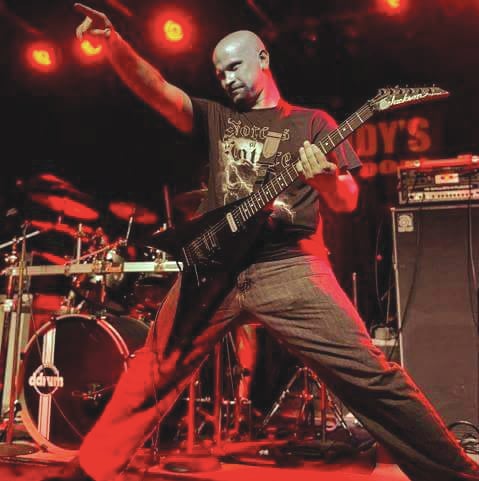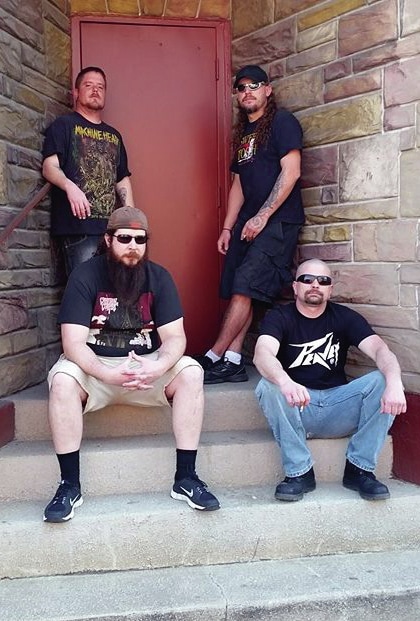



By Gary Brock
COLUMBUS — When iconic heavy metal singer Rob Halford of Judas Priest took the stage July 18 and performed with new wave Japanese heavy metal band Babymetal, many fans in the tradition-soaked genre were surprised.
But Bowling Green State University anthropologist and pop culture professor Dr. Jeremy Wallach said the collaboration didn’t surprise him at all.
Heavy metal music isn’t just growing in popularity in the US, it is growing in worldwide appeal, he says. And with that international growth comes a shift in what defines heavy metal music.
The historic pairing of “old and new” music didn’t surprise Xenia native Chris Elliot of Wilmington or music blogger Jonathan Williams of Washington Court House, either.
On the Alternative Press Music Awards show stage in Columbus, Halford and Babymetal lead singer Suzuka Nakamoto broke into the iconic Judas Priest songs “Painkiller” followed by “Breakin’ the Law.” The jaw-dropping 13-minute performance received a standing ovation in the packed Shottenstein Center.
The pairing drove home both the growing appeal and growing international flavor of metal.
In fact, “goregrind” metal musician Dylan Taylor Lehman of Yellow Springs says it is this very international growth of metal music that he finds most appealing.
Lots of changes in metal
Elliot is the lead guitarist with the metal band Omine. He says he has seen a huge resurgence in heavy metal in the last few years.“There are bands taking metal in a whole new direction. The metal scene is getting a lot larger.”
A Xenia High School graduate, he said that the Dayton Metropolitan Area has been rated as the nation’s 14th most popular metal scene. Elliot said metal music has always been a mainstay in the industry, but it is now growing and changing. “I have seen a lot of new bands coming out. It is a really exciting time right now.”
Elliot’s four-member band consists of himself on guitar, Tim Hasty from Dayton on vocals, Cole Bohanon of Centerville on bass, and Cory Hall of Xenia on drums.
His band has been together about a year and a half. Their genre is more of a death metal, power metal band. They play almost every weekend across Ohio and other states, now opening for national metal bands such as Cannibal Corpse.
“It is definitely a different ballgame being on the national stage,” Elliot said.
He is listening to bands such as Trillium, Dying Fetus, All That Remains, Dream Theater, Megadeth and Slayer “of course.”
Music for its own sake
Commercial success and growth of metal isn’t what interests Lehman, a member of the Dayton-based metal band called Orchiopexy.
When asked about the growth of international metal, Lehman said, “I would argue that the international aspect of metal has been there since its inception. When this started in the early to mid-80s, when this extreme form started evolving, it spread through the bands exchanging tapes all over the world. You would have people developing pen pals and they would have their friends sending them tapes. So you had this huge underground network — before the internet — of people dubbing tapes for each other.”
He said that is how a lot of the major, legendary bands got their starts. “These were teenagers obsessively mixing tapes for each other. That is the reason I like this kind of music. It is community, self-contained on its own terms. There are labels releasing this goregrind metal, but I like existing outside of that – trading this music and sharing it for the sake of it. Completely underground,” he said.
Lehman says he likes traveling and meeting people around the world. “And the fact that I have had pen pals in Finland, Indonesia, Japan, Slovenia who would send you music from that part of the world. I thought that was just great.”
He said people just weren’t aware of that part of the music scene. “It isn’t a bad thing to make money, but when people feel like they need to be treated as rock stars, it takes away from the friendliness of it all. Treating it like a business turns me off. I think this is, for the most part, one of the last bastions of communications that hasn’t been corrupted by businesses.”
Has international metal had an impact on American metal music? “Oh sure. Distinct areas, countries and even cities will have distinct takes on metal that appeal to people. Grindgore …was started in Birmingham, England by a band called Napalm Death in the early 80s and caught on with fans around the world and spread from there,” Lehman said.
In Colombia, he said bands there play a very specific type of death metal that is instantly recognizable as Colombian. Certain sounds can be the hallmark of that country, Lehman pointed out.
The future of metal? “In terms of the bands with broader appeal and becoming more popular, that really isn’t where my interest is. I would argue that the kind of music I like will never be popular anyway. To me, it would be cool if more bands decided to play outside of the rules.”
Respect and the color of money
Has metal as an American music form received the credit it deserves for popularity and record sales?
“In this sort of retraction and retrenchment in the music industry, (music executives) notice that people who are into metal still buy records. They are not as reviled and dismissed as they once were. Metalheads have a certain market value that they didn’t used to have. That said, heavy metal traditionally has not been a favorite of the critics,” Wallach said.
But what has changed is that metal fans have grown up. “What is striking is the number of people who didn’t stop listening as they grew up and the number of us who came back to metal. A lot of us took a break when we were in our late 20s, and then in our late 30s came back to it.”
Wallach said the most articulate defense of metal he has seen in the mass media has come from places like The Atlantic Monthly writer in a blog called Pop Matters, and written by people about his age.
“When you reach your late 30s, suddenly you are not some little kid that everyone ignores like in the early 1980s when everyone was trashing metal. There was hysteria and anti-Satanist moral panic then. Our voices weren’t being heard then. There were no blogs or internet,” said Wallach.
“But starting in the late 2000s, we become rock critics, we become journalists, we become professors.”
But metal still is not getting a lot of respect. Wallach says he has gone to many conferences where metal is viewed quite negatively, conferences of music scholars, music critics, and they look at it with disdain.
But metal fans have buying power.
“Metalheads read – they read a lot. They are a literate bunch. That means that metal books sell. Metal records sell. People say… ‘You still buy records? You still read books?’ I get sick of people saying that,” Wallach pointed out.
“People are buying the books. There is a lot of attention paid to the music because metalheads like it. We like when people pay attention to us.”





